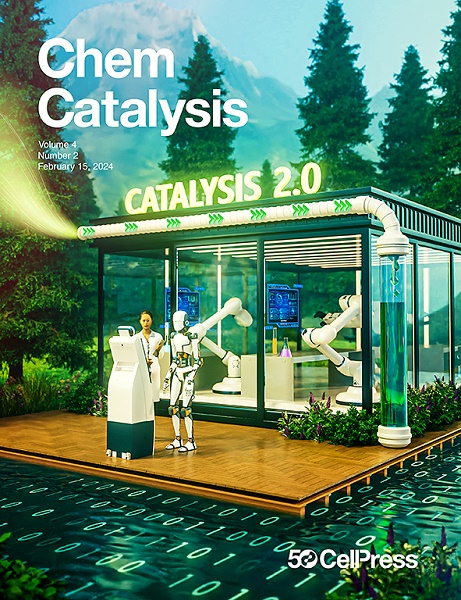利用 EC-STM 观察铂表面的阶跃束化及其在电催化中的影响
IF 11.5
Q1 CHEMISTRY, PHYSICAL
引用次数: 0
摘要
在最近一期的《自然催化》杂志上,Rost等人使用原位电化学扫描隧道显微镜(EC-STM)直接可视化了在高台阶密度下火焰退火Pt(111)邻近表面上的台阶聚集。这一现象的产生是由于距离较近的台阶之间的台阶间相互排斥作用增加,形成较宽台阶的簇状台阶会降低表面无能。这项工作挑战了普遍的假设,即所有台阶表面都呈现均匀间隔的单原子高度台阶,并在原子水平上为高台阶密度下铂表面的异常电化学行为提供了令人信服的解释,包括零总电荷的活度和电位。本文章由计算机程序翻译,如有差异,请以英文原文为准。
Visualizing the step bunching on Pt surfaces and its effect in electrocatalysis with EC-STM
In a recent issue of Nature Catalysis, Rost et al. directly visualized the step bunching on flame-annealed Pt(111)-vicinal surfaces at high step densities using in situ electrochemical scanning tunneling microscopy (EC-STM). This phenomenon originates from the increased step-step repulsive interaction between closely distanced steps, and the surface-free energy will be lowered when forming bunched steps with wider terraces. This work challenges the common assumption that all stepped surfaces present homogeneously spaced steps of monoatomic height and provides a convincing explanation at atomic level for the anomalous electrochemical behavior of the platinum surface at high step densities, including the activity and potential of zero total charge.
求助全文
通过发布文献求助,成功后即可免费获取论文全文。
去求助
来源期刊
CiteScore
10.50
自引率
6.40%
发文量
0
期刊介绍:
Chem Catalysis is a monthly journal that publishes innovative research on fundamental and applied catalysis, providing a platform for researchers across chemistry, chemical engineering, and related fields. It serves as a premier resource for scientists and engineers in academia and industry, covering heterogeneous, homogeneous, and biocatalysis. Emphasizing transformative methods and technologies, the journal aims to advance understanding, introduce novel catalysts, and connect fundamental insights to real-world applications for societal benefit.

 求助内容:
求助内容: 应助结果提醒方式:
应助结果提醒方式:


